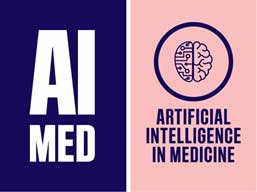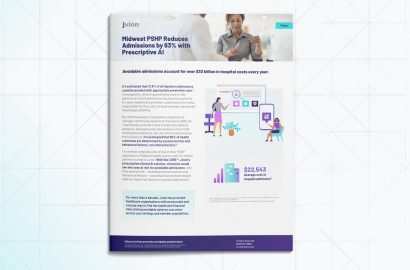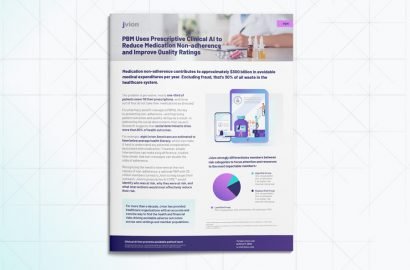
Population Health Management
Building Healthier Communities with Clinical AI
Population health depends on the ability of providers, payers and other stakeholders to understand the clinical and socioeconomic factors influencing and driving risks across individuals and the communities in which they live. Social determinants of health (SDOH), such as patients’ income level or access to food and transportation, have been estimated to account for up to 80% of a patient’s health outcome.1 The Jvion CORETM turns socioeconomic, environmental and behavioral data into real clinical value that drives higher engagement, more tailored interventions and greater alignment between community need and risk.
Jvion’s Population Health solutions enable:
- Alignment of community needs to available resources
- Understanding of hidden clinical risks driving avoidable adverse individual and community health outcomes
- Action plans based on prioritized evidence-based recommendations
- Improvement of quality and cost efforts
- Analysis of community and patient population needs down to the US Census tract level
Transformative for care models, Jvion enhances their ability to effectively address underserved populations and healthcare inequities as well as improve community resource strategies, allocation and impact.
Key products for Population Health Management include
- Avoidable ED Visit: All Cause
- Avoidable ED Visit: CHF
- Avoidable Admission: 30/60/90 days
- Sepsis
- Avoidable Admission: Diabetes
1. Modern Healthcare, “Social Determinants of Health: The Impact on Members, Health Outcomes and the Bottom Line.” modernhealthcare.com, 03/2019. Available: https://www.modernhealthcare.com/patient-care/social-determinants-health-impact-members-health-outcomes-and-bottom-line.
Featured Product
Community Acquired Sepsis
According to the CDC each year in America, 1.7 million adults develop sepsis and 270,000 die as a result. Sepsis is a medical emergency that requires prompt treatment. Jvion’s Community Acquired Sepsis product predicts which patients in the ambulatory setting are at a high-risk to be admitted to a hospital related to sepsis in the next 12 months. Insights, delivered to clinicians and case managers within their workflow, can be used to identify and treat patients early, bolster their infection prevention and vaccine practices, and inform community campaigns to help educate the general population on the dangers of Sepsis.
Who We Help
Providers
Access data and insights for providing care based on socioeconomic risk factors

Providers
Providers today often lack the access to the data and insights necessary to treat patients holistically. Clinical factors often lead care decisions, while socioeconomic risk factors are hidden in the background. The Jvion CORE provides that access and allows providers to identify the most impactful recommendations for the patients most likely to respond based on a complete picture of risk.
Payers
Use a data-driven, patient-centric, focused approach to identifying at-risk members

Payers
Payers can drill into their member population down to the individual member level to understand the social determinants of health creating barriers to achieving the best outcomes possible. With these insights, payers can steward the health of the populations they serve, providing much needed coordinated and relevant access to care and resources.
PBMs
Improve medication adherence and positively impact outcomes

PBMs
Medicare clients need help improving their CMS Star Ratings, and are looking for services to delegate to the Pharmacy Benefit Managers to support these ratings. Star Ratings are important because sponsors receive bonus payments for Medicare Advantage plans. The Jvion CORE enables Pharmacy Benefit Managers to take a data-driven, patient-centric, focused approach to reviewing claims data and identifying at-risk members based on their paid medication claims history and socio-economic data.
Partners
Integrate prescriptive AI insights into SDOH platforms to build healthier communities

Partners
Strengthen existing care management, patient engagement and analytic platforms with prescriptive insights from the Jvion CORE.
Patient Impact Story
Addressing Socioeconomic Determinants Improves Overall Health
A 65-year-old male has lived his entire life in downtown Atlanta. He struggles with obesity, high blood pressure and diabetes, and can’t get around like he used to anymore. The closest grocery store is 2 bus rides away and it’s difficult for him to make the trip, so his only option is the corner mart 2 blocks from his house. Most days he eats a hot dog because they are 3 for $1 and some boiled peanuts because he can snack on them through the afternoon. Most dinners are frozen meals that can be quickly heated in the microwave. He has no idea he lives in what is called a “food desert” in the middle of a major city — until he gets a call from his doctors office saying he has been identified as eligible for a new fresh and healthy food program being offered from a Food is Medicine program by his local hospital.
His provider was able to identify him by using the Jvion CORE. Now, he gets a box of fresh and healthy food delivered each week, with recipes included. He has enjoyed cooking new things and has lost weight. He now feels better and can take the bus to go to the grocery store and to other places around town. He is thankful for the program.







